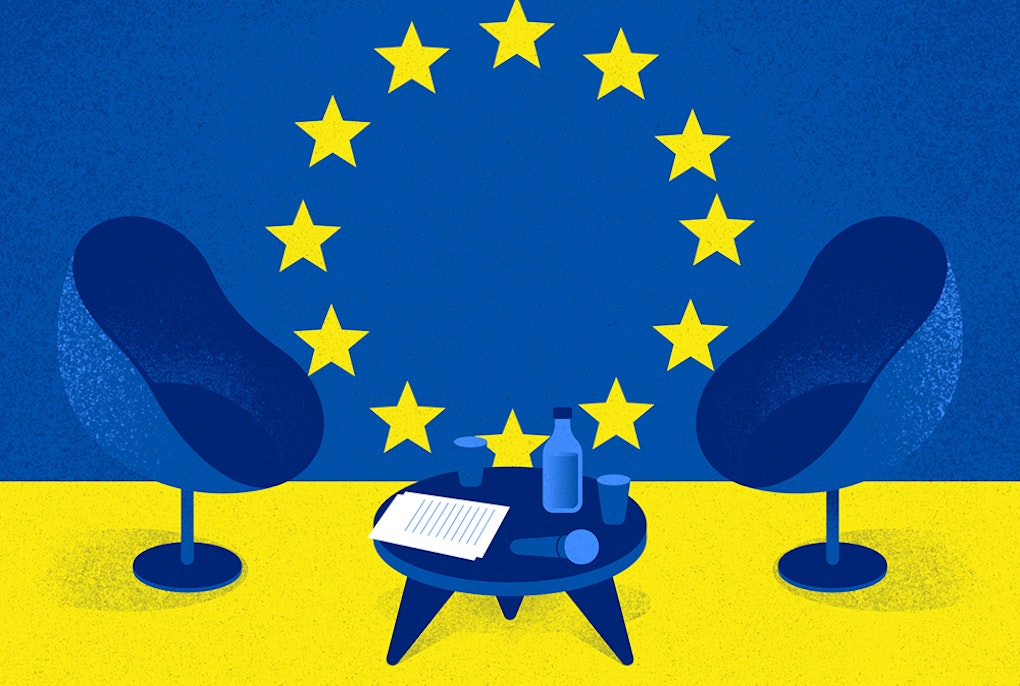
Vox Pop: Saskia from Estonia
 Theresia Morandell
Theresia Morandell
Respect for the rule of law in Serbia, Bosnia and Herzegovina and Kosovo shows similarities due to the close relationship between government, media and courts. However, attention should also be focused on the peculiarities that characterise the independence of the judiciary and freedom of the press in these three countries.
Despite the fact that the Serbian Constitution guarantees press freedom and criminal law does not include defamation as an offence, media freedom is threatened by continuous legal actions by political representatives against journalists, such as accusations of involvement in illegal activities. In 2019, Serbia’s Association of Independent Journalists (NUN) documented 119 episodes of political pressure or violence against journalists. One example being the case of investigative reporter Milan Jovanović, who in December 2018 survived a fire that broke out in his home who at the time, was conducting an investigation on political corruption in Serbia. Following the attempt on Jovanović’s life, an official of the Serbian Progressive Party (SNS) stood trial after being charged with arson. Lack of transparency in media ownership and pressure from politicians on newspapers’ editorial choices contribute to enhanced self-censorship, and the Electronic Media Regulatory Body (REM) has been criticised for a lack of independence in overseeing journalistic and broadcasting activities. Collusion between politicians and the media and the spreading of fake news are tacitly promoted by Aleksandar Vučić's government. As the Open Society Institute's report points out: "Parliament has allowed members appointed by the political power to sit on the Communications Council for six years, whereas candidates from civil society and professional associations in the sector only serve for four years". Finally, the high concentration of media ownership in the country prevents independent journalists from publishing their investigations, which are almost exclusively available on the Internet.
Furthermore, from the perspective of the judiciary system, its independence is compromised by political influence in the appointment of judges and prosecutors. In addition, many judges have reported being subjected to external pressure during trials. Politicians regularly comment on ongoing judicial proceedings and investigations, de facto delegitimising the work and role of judges. A specific feature of the Serbian judicial system is the governmental interference in the allocation of cases to judges. Although the law establishes the principle of randomness in the choice of the judge (with the aim of limiting corruption), this rule is often not applied, which severely limits the guarantee of a fair and impartial trial. Cases involving political representatives are particularly vulnerable to interference.
In Bosnia and Herzegovina, press freedom is guaranteed by the 1995 Constitution but remains severely restricted in practice. Journalists are subject to political pressure, harassment, threats and attacks, including both ethnic and religious attacks as well as multiple defamation lawsuits by politicians aiming to intimidate journalists in their daily work. Private entities directly finance and manage news networks and together with political parties also direct their editorial lines. Moreover, the radio and television stations of the two territorial entities that make up the State of Bosnia and Herzegovina also broadcast programmes polarised along ethnic-territorial lines. This stance is also present at the cantonal level being used by local political parties to spread nationalist rhetoric in opposition to the communities of the other entity. This practice is most evident in Republika Srpska, where according to Freedom House's 2020 report, the Radio and Television of Republika Srpska (RTRS) can be considered as the direct communication service between the Alliance of Independent Social Democrats (SNSD) and the Bosnian Serb population.
The judiciary is formally independent and safeguarded by the Constitution, but reform attempts by political parties of the entities seriously undermine the decisions of the Constitutional Court and the European Court of Human Rights (ECtHR). Dozens of sentences have been ignored or openly challenged by political leaders, in particular by the SNSD and the Croatian Democratic Union of Bosnia and Herzegovina (HDZ-BiH). The simultaneous existence of four separate judicial systems - the (partly incomplete) central state, Republika Srpska, the Federation of Bosnia and Herzegovina and the Brčko Autonomous District - makes the Bosnian judicial system even more fragmented and confused. In 2019, Bosnian investigative journalists published a video which was proof of collusion between police inspector Marko Pandža, businessman Nermin Alešević and the president of the High Judicial Council (HJPC) Milan Tegeltija on the online portal Žurnal. The video, exposed the three discussing the cover-up of a court case. In this regard, the State Prosecutor's Office does not appear to have taken particularly urgent action, while the National Security Agency (SIPA) suspended the public official only nine days after the video was published. Access to adequate legal advice may depend on one's financial capacity, in turn leading to unequal treatment of defendants. Conversely, trials in national courts of those accused of war crimes have been prolonged indefinitely due to countless political interferences and lack of resources.
Kosovo's 2008 Constitution guarantees press freedom and stipulates that communication systems, including Radio and Television of Kosovo (RTK), should be public. However, the government of the former Prime Minister Ramush Haradinaj and commercial interests still exert constant pressure on the editorial lines of newspapers and the RTK's schedule. As in the other two Western Balkan countries, journalists in Kosovo have repeatedly complained of harassment and intimidation. Media and broadcasting programmes in Kosovo remain divided along ethnic lines. Access to information is often limited to one ethnic or political group, and most media outlets focus on issues concerning their own community (Serb or Albanian). Numerous media platforms in Kosovo are not financially stable, which makes them susceptible to political influence and often results in self-censorship. The few existing minority media outlets only resist the system imposed by the government and survive through income from abroad. With regard to the independence of the judiciary in Kosovo, there are serious cases of intimidation directed towards prosecutors. One of the most notorious episodes involved State Prosecutor Elez Blakaj who, in 2018, was forced to resign following threats received from MP Shkumbin Demaliaj during the investigation of a fraud case regarding the pension system of war veterans. Although involved in the fraud and charged with intimidation, the MP was placed under house arrest for less than one year before resuming his seat in Parliament. Despite the law stipulating that defendants should not be detained before trial unless they are likely to flee or tamper with evidence, judges often order suspects to be held pre-trial, and without justification. Finally, the lack of funding for the justice system as a whole, contributes to longer pre-trial detention periods and inefficient legal advice.
Although respect for the rule of law would allow Bosnia and Kosovo to achieve candidate status and facilitate Serbia's accession process, the EU does not seem to be particularly involved in projects on the ground. As Nedim Hogic points out: "Progress in the enlargement process [...] has not equated to progress in the strength of the rule of law and the quality of governance." This is because the EU's influence on the three states has not yet been translated into projects aimed at strengthening the rule of law either at the local or institutional level. In fact, it’s the local NGOs, such as the Association for Democratic Initiatives (ADI) in Sarajevo, that are actually taking on the task of promoting democratic transition and anti-corruption initiatives. While a multitude of local organisations implement specific plans to support citizenship, international organisations like the European Union are almost completely absent in this context. As a result, the EU's presence in the three countries is limited to the role of inspector of advances in the rule of law and judge if the required standards are not met. Finally, the lack of a structured plan aimed at improving the various shortcomings in the rule of law in Bosnia, Kosovo and Serbia leads to two different situations of stasis. On the one hand, Bosnia and Kosovo do not receive the necessary technical support for the 'transition of status'. On the other, Serbia, thanks to the investment it received from the EU as a candidate country, has neither the targets nor the deadlines to make rapid progress in the accession process. In both cases, therefore, the reforms for freedom of the press and in the judiciary system do not find fertile ground for their effective translation into reality.
This article is part of EUreka!'s collaboration with Lo Spiegone.

This content is licensed under a Creative Commons Attribution 4.0 International license.